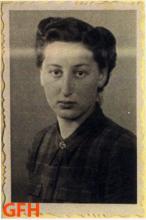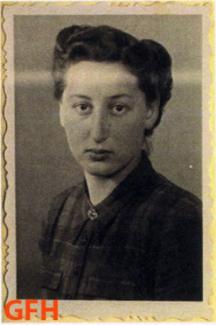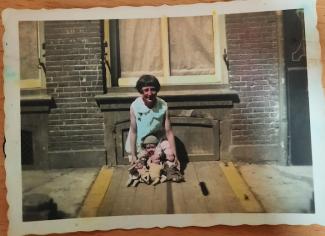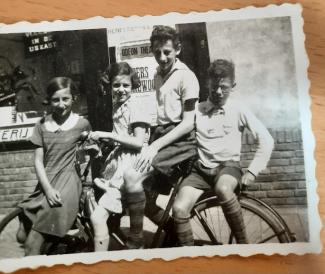Betti Frank-Koppel
Familie - Verhaal - Foto's - Verkaufsbuch - Bronnen

Zutphen,
- Israël,
Betti werd 78 jaar
Woonde Lange Hofstraat 26
Er is een Stolperstein voor Betti gelegd.
Familie
Ouders: Billa Koppel-Zeligman, Henri Koppel
Verwant: Jacob (Jacques) Koppel
Verhaal
Betti Frank, née Koppel, was born in Zutphen, Holland. Her parents had a butcher shop. She briefly describes pre-war life. Betti and her brother belonged to Hehalutz, a Zionist youth group.
Betti describes life after the German invasion, including registration of Jews, roundups, Razzias, raids, and collaboration by some Dutch people. The Dutch police arrested her father, sent him to a Dutch concentration camp and then to Mauthausen where he was killed.
Betti describes how later the Dutch police came back for the rest of the family: Betti and her mother were taken to a building owned by the Jewish community which had been converted into a hospital for older Jews. She describes the round up of elderly and sick Jews in the community. Her brother was deported to Westerbork. She found out after the war that he was killed in Auschwitz.
In April 19431, Betti and her mother were deported to Vught concentration camp with all Dutch Jews who did not live in Amsterdam. She describes in great detail their arrival, the horrible conditions in Vught and a separate children’s camp where her mother worked as a nurse, Appells, extreme cruelty and constant terror.
She also describes contact with non-Jewish prisoners and an offer to her by Hehalutz members to escape with false papers which she turned down to stay with her mother. Her mother was eventually deported along with the children and she never saw her again. Betti was then assigned to a slave labor group working for the Philips company together with non-Jews making radios and welding. She talks about how the SS tried to deport this group to Auschwitz several times and how they were saved by working for Philips.
Finally in June they were sent to Auschwitz arriving June 6, 1944. She describes in great detail their brutal reception, processing, conditions and cruel treatment from Jewish Kapos. After 10 days, Betti, with the group selected by Philips, was transported out of Auschwitz to a factory in Reichenbach to work with German civilians. From there, the workers were sent to Lanowice concentration camp, and later forced on a death march to Trausenau, Czechoslovakia in February 1945, then forced on rail cars to a small camp near Port of Westfalen close to the Dutch border.
Betti describes in detail their deportation to and working conditions in several camps: a salt mine in Braunschweig, Magdeburg; Lüneburger Heide, where they had to dig trenches at the front; and finally a small camp in Hamburg. She describes brutal living and working conditions, cruel behavior by German civilians, and some acts of compassion in great detail. She talks about some of her survival strategies and how she saved her life by following her instinct.
After the end of World War II, the prisoners were transported to Denmark under the auspices of Folke Bernadotte. They were sent to either Malmo or a “holiday” camp near Göteburg in Sweden, depending on their physical condition. Betty again worked for Philips. After a stay in Holland, she emigrated to Israel on March 12, 1950.
Foto's




